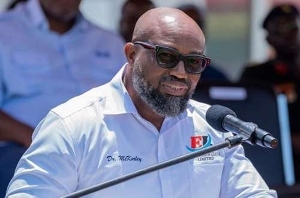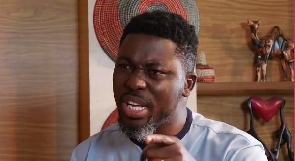Opinions of Tuesday, 24 September 2013
Columnist: Kwarteng, Francis
Africa’s Development Facing Its ....
Africa’s Development Facing Its Greatest Intellectual Crisis: Response to My Critics—(l)
I have received tons of emails from readers asking me to clarify a few questions and, if possible, to provide some documentation to that effect. The preponderance of commentarial queries had concerned the role of Afrocentric theory in re-orienting the cultural psychology of Africa, Eurocentric critique of the theory, the potential of the theory to undermine Africa’s full engagement with the rest of the world, and other such questions. These questions are technically relevant, even worthy of our critical responsive attention. Let me say upfront that I shall develop my responses over five installments—because the theory has more to say about ethnocentrism, development, tolerance, love, African unity, political corruption, democracy, racism, international relations, feminism, progressive politics, race relations, parenting, and the like.
First, I shall respectfully refer readers to my Ghanaweb feature articles “Decolonizing the African Mind,” “Afrocentricity and the Future of Ghana,” and “Culture, Respect, and Development” for definitions of Afrocentricity. Second, I shall also refer readers to Dr. Ama Mazama’s “The Afrocentric Paradigm” and “Africa in the 21st Century: Toward a New Future,” as well as Dr. Molefi Kete Asante’s “The Afrocentric Idea,” “Kemet, Afrocentricity, and Knowledge,” “Afrocentricity: The Theory of Social Change,” and “Afrocentricity.” From a personal perspective, I believe these select source bibliographies make the most authoritative statements on Afrocentric theory. Let me know if you disagree!
Let’s begin to address some of the questions from this perspectival commentary: A keen commenter observed that Afrocentric theory was singularly developed in response to slavery and its legacy and, therefore, since Africans themselves were involved in selling other Africans to Europeans, then, the conversation must end there. This isn’t entirely wrong, however. Yet it’s also not only a misplaced perspective but a misapplied logic as well. For instance, there was Jewish collaboration with the Nazis, but the question of Zionism—which gained ideological traction and psycho-emotional currency after the Holocaust—doesn’t end there. It continues in full swing today.
Of course the twin questions of slavery and its legacy are integral to the theoretical landscape of Afrocentricity. But it's more than just that. In fact, Randall Robinson’s “The Debt: What America Owes to Blacks,” Frederick Douglass’ “Narrative of the Life of Frederick Douglass,” Joy Degruy Leary’s “Post Traumatic Slave Syndrome: America’s Legacy of Enduring Injury and Healing,” and Molefi Kete Asante’s online articles “The Slave Trade and Reparations: Closing the Gates,” “The African American Warrant for Reparations: The Crime of European Enslavement of Africans and its Consequences,” “The Ideology of Racial Hierarchy and the Construction of the European Slave Trade,” “Henry Louis Gates is Wrong about African Involvement in the Slave Trade,” and Franz Fanon’s “Black Skin, White Masks,” to name but few, will help us understand the nature of the institution of Transatlantic Slavery. The Muslim Trans-Saharan Slave Trade is another issue all together.
But they represent one face of the historical coin. In fact, Africa—of yesterday and of today—bears the psychological and physical scarification derived from the impact of slavery, too. Most of the men, women, and children stolen and carted off across the expanse of the Atlantic represented some of the healthiest, physically and psychologically, in our ancient communities. The slavocratic hand of Europe enslaved many of our skilled farmers, linguists, metallurgists, philosophers, builders, kings, queens, interpreters, soldiers, professional advisors to kings, politicians, traders, herbalists, fishermen, cosmologists, midwives, etc. And African “inferiority complex,” one of the legacies of slavery? That’s infinitely unquantifiable!
Granted all that, what does Afrocentric theory actually respond to? Racism! Rather pointedly, Afrocentric theory responds to racism in the fields of historiography, epistemology, culture, Egyptology, classical scholarship, psychology, comparative linguistics and religion, politics, anthropology, paleontology, history of science and of philosophy, race relations, sociology, economics, science of pedagogy, social science, feminist scholarship, and what have you. Understandably, some of the observations in the commentarial library are similar to those critics of Afrocentric theory who have not read or seen a page on which Afrocentricity is developed—I say this in jest.
I know many of them, the critics of Afrocentricity—Mary Lefkowitz, Shelby Steele, Stephen Howe, Kwame Anthony Appiah, Arthur Schlesinger (John Kennedy's biographer), GM Rogers, etc. Most of the critiques out there are mere politics of distortions and of creative aversion. In other words, the critics conveniently skirt the substantive issues raised by the theory of Afrocentric. I have thoroughly examined the spectra of Eurocentric critiques myself and, as a result, do not think they are worth our time and our repeating them here since we cannot put our stock in their spongy and colander of watery arguments.
Please do read Molefi Kete Asante's "The Painful Demise of Eurocentrism: An Afrocentric Response to Critics," Martin "Bernal's Black Athena: The Afro-asiatic Roots of Classical Civilization (The Fabrication of Ancient Greece), Vols. 1, ll, and lll", "Black Athena Writes Back: Bernal Martin Responds to His Critics," the edited volume "African Athena: New Agendas," Maghan Keita's "Race and the Writing of History: Ridding the Sphinx," JH Caruther's "Intellectual Warfare," Shohat's and Stam's "Unthinking Eurocentrism: Multiculturalism and the Media," and Binsbergen's "Black Athena Comes of Age: Towards a Constructive Re-assessment," etc. These sources authoritatively confront Eurocentric critique of Afrocentric theory in all of its ideological shades.
Interestingly, authoritative post-colonial literary scholars such as Ngugi wa Thiong'o had even given a talk at Harvard University, the WEB Du Bois Institute for African and African American Research, some years back, on the importance of Afrocentric theory in addressing Africa’s problems. His book "Something Torn and New: An African Renaissance," a collection of his presentation, deals with many of your questions and other such related matters. Further, Afrocentricity is presently taught in Europe, in Africa, and in America. It’s even popular among some pre-eminent Asian scholars. Ironically, many of the virulent critics of the theory, like Wellesley Mary Lefkowitz, have come to accept it, although grudgingly. They even teach it alongside their Eurocentric courses in Western academia, America mostly.
One of our commentators also indicated that Afrocentricity is isolationist in theoretical scope and ideological complexion. Admittedly, this critique is problematic in its visionary depth. And here is the sociological actuality: Most of the white critics of Afrocentricity who say black people should join the “global village” will not allow us, you and I, into their communities, the psychosocial domiciles of Eurocentrism. And since charity begins at home, why don't black people learn to get together, as Kwame Nkrumah and Marcus Garvey preached, and learn to build stronger communities first before joining those whose communities are already stronger than theirs? Afrocentricity isn’t about separatism; it’s about creative, harmonious, progressive, and commonsensical particularism! We shall expand this idea in subsequent installments.
After all, can a paperweight and a heavyweight be expected to equally share the pie of pugilism in the same ring? For instance, would any of us be willing to abandon nursing our priorities, like caring for our sick grandparents, parents, siblings, or children, for someone else's? I don’t think I will leave my house which is on bonfire to attempt dousing someone else’s! This is natural law. And commonsensical. The African American lawyer Randall Robinson observes: “How can you paralyze a sprinter by shooting him in both legs and then asking him to compete with others whose legs are intact?” This is the dilemma the African world is confronted today.
Again, I refer you to Asante’s articles on slavery. There, you will appreciate the fact that the history of slavery—its contemporary interpreters and historical perpetrators—is highly politicized for psycho-economic reasons, I mean, slanted, to favor the Western world, that is, to absolve the West—which initiated it.
In fact, some scholars, like Asante, prefer to refer to slavery as "The European Slave Trade," not as "Transatlantic Slave Trade." Ironically, slavery is even claimed by White scholars to have been first institutionalized by one Anthony Johnson (or Antoin), an Angolan indentured slave, not whites, who introduced it into North America, Virginia, where the institution of slavery is believed to have formally begun.
So, you see, even in colonial America, the burden of responsibility—as far as the formalized initiation of the institution of slavery is concerned—is conveniently hinged on the African. That is how the bruised personality of Western psychology avoids moral responsibility for historical crimes. Again, to complicate the discourse related to the formalized genesis of slavery, Eurocentric historians have seen fit to employ the politics of linguistic obscurantism, using “African slave” where “enslaved African” is the appropriate phraseology.
I shall return with “Response to My Critics—(ll).











